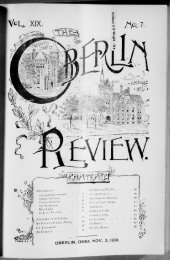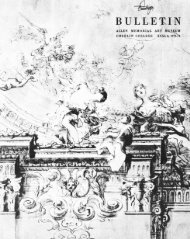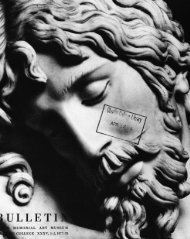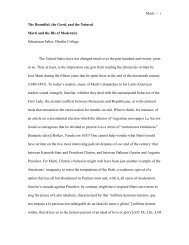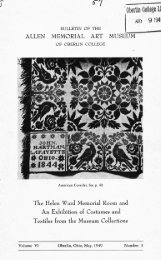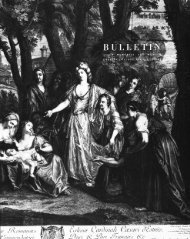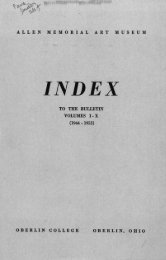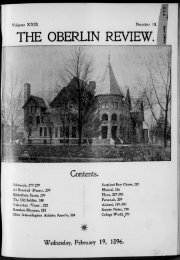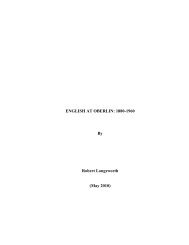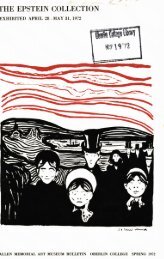Oberlin College eview. - Digital Resource Commons - Oberlin College
Oberlin College eview. - Digital Resource Commons - Oberlin College
Oberlin College eview. - Digital Resource Commons - Oberlin College
You also want an ePaper? Increase the reach of your titles
YUMPU automatically turns print PDFs into web optimized ePapers that Google loves.
<strong>Oberlin</strong> <strong>College</strong> <strong>eview</strong>.<br />
Vol. I. Wednesday, October 7, 1874. Number 13..<br />
H'ontrilHiteil.l<br />
Sympathy with All Ages.<br />
I'KOF. i:. I liAHKOWS, I). I).<br />
The mushroom may spring up in a night, but not the mighty<br />
oak. This lias in it the growth of centuries. It has attained<br />
to its present size only by continuous progress through these<br />
centuries. A thunder-stor- m may produce a torrent, swollen,<br />
turbid and roaring, hut when the shower is over the torrent<br />
disappears with it. Not so the broad and ever-flowin- g Mis-<br />
sissippi. That has a history. That has grown to its present<br />
size by innumerable contributions all along its path. Even-lak- e<br />
and spring, every shower of rain throughout the whole<br />
valley ot the Mississippi is represented in the majestic tide of<br />
waters which it pours from age to age into the Mexican Gulf.<br />
Just so it is with history the history of mankind at large,<br />
and especially the history of the kingdom of God. God's<br />
Church is the river that has rolled down to us from Eden. It<br />
has in it the whole course of Providence from the beginning.<br />
The present is the product of the past ; and can be truly<br />
studied and understood only in the light of the past.<br />
Tor the better illustration of this let us take a small section<br />
of Christendom, sav the Xew England States. What New<br />
England is she<br />
to-da- y,<br />
is by virtue not merely of present in-<br />
fluences coming upon her from without (though these have<br />
their share of moulding power,) but emphatically by virtue<br />
t her. past historv from the bcinniiiLr. But her history can-no- t<br />
be separated from the character of the pilgrim fathers<br />
lio founded her. Their character, again, was formed in Old<br />
Kland. in the midst of that stern conflict for civil and<br />
relig-,,,U- s<br />
bedom, which shook the nation to its centre. Neither<br />
earlier nor later in the historv of Great Britain could she have<br />
sent forth such a sturdy, uncomprom sing band of Christian<br />
freemen. But the conflict of their day grew, necessarily, out<br />
of the previous current of British history in two distinct but<br />
mterlocking.streams that of their civil, and that of their ecclesiastical<br />
establishment. And the underlying, animating:<br />
Principle of both was Christianity. This links the revolution<br />
Great Britain, in Cromwell's day, with the struggles of the<br />
Christian Church from the primitive ages; and thus with the-- .<br />
Whole history of the Mosaic religion; for out of this was dc- -<br />
sloped Christianity. As the New Testament cannot be separated<br />
from the Old, so neither can the Christian from the<br />
Jewish Church. Both together constitute, ;ii God s plnn, one<br />
indivisible whole. The New Eng'tmd of to day has in --<br />
herself, then, the whole history of Goo's Church from the be<br />
i<br />
'<br />
ginning this historv linked in, as it has ever been, with that<br />
of the civil governments of the world.<br />
Since, now, the present is a product of the past, and can be<br />
truly undertood only in its light, it follows, that to neglect or<br />
'despise the past is a mark of folly. It is this which consti-<br />
tutes false radicalism. - The radical man, in the bad sense of<br />
the term, has no sympathy with anything that has existed be-<br />
fore him. He knows nothing but the present, and he acts<br />
upon the supposition that to the men of his age belong all the<br />
treasures of wisdom. The natural consequence is a destruc-<br />
tive policy, that pulls down without either the skill or the pow-<br />
er to build. He finds everything human marked with im-<br />
perfection, and his plan is to set all aside without ceremony,<br />
to make way for his theories of a perfect order of things. Of<br />
this spirit the leaders of the first French revolution were the<br />
incarnation. Their idea was to abolish the whole fabric of<br />
the past, that they might begin with their "Year One." The<br />
result is known to the whole world.<br />
But while a deep sympathy with the past operates, on the<br />
one hand, as a preservative from this false radicalism, it opposes<br />
itself, on the other, to that false conservatism, which<br />
aims to petrify society in its present form, as if all change<br />
were degeneration; while a true knowledge of history shows<br />
that society has attained to its present state only through the<br />
experience of successive generations. It also teaches that it<br />
is not the plan of Providence that the world should ever be-<br />
come stationary. As it has always been moving forward, un-<br />
der God's guiding hand, towards something higher and bet-<br />
ter in the future, so it must continue to move. It is a river<br />
that cannot stop anywhere in its progress to the final consummation.<br />
' If at times its current, like that of the Arar, described<br />
by Civsar, is so gentle that it seems to be motionless,<br />
it is still bqrnc onward by a resistless force. Attempt to ar-<br />
rest it and you make a Niagara. An inward power, which<br />
nothing can destroy or withstand, is carrying society forward<br />
from stage to stage, in accordance with God's high purposes.<br />
Whoever, then, has a true sympathy with the past, must<br />
have also, a warm sympathy with the future, ever looking<br />
forward to it with those exalted hopes which Scripture<br />
warrants him in cherishing. And since it is through the<br />
present that the past and the future are connected, he must<br />
have, likewise, a warm sympathy with the present. Such a<br />
man will believe that God is at work in the present, as he has<br />
been' in the past, and will be in the future; that while the<br />
principles ot his government arc immutable, the application<br />
of them to human society, must bring in the future innumer-<br />
able changes, as it has done in the past. As he will not dc- -
98 <strong>Oberlin</strong> <strong>College</strong> R<strong>eview</strong>.<br />
sire change for its own sake, so neither will he look upon all clilCctions of the students are in sympathy with the positions<br />
change with suspicion, as if it must be, of itself, an evil. Such tajen tjlc instructor, investigation ceases, inquiry is at an<br />
a man, who has sympathy with all ages, is the only true re- -<br />
former. ,<br />
lost<br />
IContnluitcit.T<br />
New Blood in Education.<br />
, , investigation,<br />
cm tjlc ;nlcrest 0f the student flags, and the instructor has<br />
a great incentive to effort. The method changes from an<br />
common to all,<br />
ft ' to dogmatic<br />
"<br />
assertion<br />
one hanc1' and Passivc receptivity on the other.<br />
on the<br />
That this is not the proper preparation for the battle of life,<br />
It seems to be a principle, founded alike upon nature and will be accepted upon mere assertion. The graduate, instead<br />
revelation, that, for the highest development of the human of coming forth a strong man, armed and confident in his skill<br />
race, the blood of near degrees of consanguinity must not and prowess, proved in a hundred encounters, knows neither<br />
be mingled. And, as if to prove that a law which works llis strength nor his weakness. He knows not how to avoid<br />
secretly and in silence can control the greatest events, it is an attack, because he never has been attacked, and fails to<br />
confidently asserted that the great nations of the world have Profit by. victory, because he never fought a battle and never<br />
been mixed nations, and that the progressive stage in each won a victory.<br />
corresponded with, or immediately succeeded, the infusion of two remedies lie within the rcath of the student. lie<br />
new blood. Striking as this fact in history is, and generally ,na' take his course partly in one college and partly in<br />
admitted as is this principle, it does not seem to have occurred anthcr ; or, he may insist that, whenever it is practicable,<br />
to many educators that the same law holds true in the world m a changes in the faculty, new men men educated elsc- -<br />
of ideas, and should be recognized in every system of in- - where shall be appointed to fill vacancies,<br />
struction. New methods and new ideas are as necessary to The first has many discomforts, among which are the scve- -<br />
colleges as new men and new blood are to families. "g of many pleasant ties, and the idle and sometimes un- -<br />
Such is the dearth of originality, that he who originates a just criticisms of those who imagine that a college has a lien<br />
single idea may fairly claim to be an original man. Many uPon the education which it gives its students. The second<br />
men have lived, been called great, and died without enter- - is 80 clearly for the advantage of the college at large, as well<br />
taining an idea not acquired from without. Not only this, as ot llle individual student, that he may claim it is as a right,<br />
but the stock of ideas possessed by each individual is small, The current plea that it is necessary to have instructors whose<br />
and, when called upon to convey them, he quickly exhausts views arc il perfect sympathy, is the offspring of timidity,<br />
them. This is true of instructors, as well as of other men. aml possibly, bigotry. Opinions which cannot hold their<br />
They, accordingly, are induced, cither voluntarily or involun- - own in a fair fight are not worth maintaining by less frank<br />
tarily, to use constant repetition, perhaps not of language, but methods.<br />
of idea and of thought. So well recognized is this among Xuw mea will bring new methods, some of which, it is fair<br />
to Pastime, will be improved methods. A new method,<br />
students, that the shrewd ones have been known to prophesy<br />
what would be the sage reflections of some professor upon cven if not intrinsically better, where introduced by way of<br />
a future lesson, and it is a matter of universal experience that clian?e, often will serve to awaken interest. A new man,<br />
a thoroughly annotated text-boo- k rarely needs revision in the moreover, has a reputation to make, and is more nearly meas- -<br />
hands of subsequent classes. It consequently results that an<br />
urcd according to his merits. He will exert himself more<br />
institution soon acquires a fixed set of ideas in matters of dis- - strenuously, make a better record, and accomplish more than<br />
c.phne, of morals, of manners, a.id upon all the questions he would were he placed in a corresponding position in the<br />
arising ,n a college course. This status, so long as the men faculty of hi Alma Mate. A new man will teach his asso- -<br />
remain the same, can change only as the individual instruct- ciatcs - many things, and thus exert an 'indirect influence<br />
ors progress in knowledge But in poverty-stricke- n colleges, scarcely less latent for the good of the student,<br />
w ere the faculty are paid starvation salaries, and each mem- h is - not a kindness to promote a student or an alumnus to<br />
er is required to do the work of three or four men, the ac- -<br />
the Posit'on of tutor or professor in the college where he has<br />
action of new ideas by the instructors i,, and must continue 1,ccn educated. It would be better for him to go elsewhere,<br />
to be, exceedingly small. A student soon learns about all<br />
aml bc"er for his Alma Mater to have some one else to fill<br />
such instructors can give outside of the<br />
his<br />
text-book- s, and as if Pla. A Z<br />
2 r A'X" a,ettcnd:"Men<br />
thcmselves ha" cdu- - g.ve me<br />
cited<br />
credit<br />
havXitcSlrT<br />
for<br />
and<br />
genius.<br />
where the ,,m,<br />
All the genius I have, lies just in<br />
CntC,tainCd ",at ",C- -<br />
T' WhC" 1 lm'C " !" LiXy.<br />
1 "<br />
This does !'<br />
1CfrC ",0- - 1<br />
not influence the student ""<br />
alone Th '<br />
I ' 7<br />
" " n<br />
effect ' Ca" thc fr,lIt of - upon the B'- lt is the l of<br />
1 n me instructor<br />
instructor. IWr Nothing so well enforces cftort Wand of thought" '<br />
and accuracy on '<br />
the part of a teacher as a skeptical ' W Tl ,<br />
inquiring class of students " If ,t aU ,i, P'C.I'"1'S and pre- - thing for. a man to<br />
'<br />
do all he can".<br />
,he , lh's saying is attnhuted to John I5rown: '--<br />
It is<br />
a mighty
Contributed.<br />
Personal Liberty.<br />
j. w. welsh, '78. '<br />
The idea of liberty has been as a mighty pillar, around<br />
which all the great conflicts of earth have gathered and<br />
raged ; for it heroes have toiled and suffered, for it multi-<br />
tudes of martyrs have laid down their lives. It has been the<br />
theme of nations and the song of poets, and, in its name, the<br />
grandest and most sublime sacrifices recorded in history have<br />
been made. And yet, the majority of men are slaves; aye,<br />
slaves more servile and abject than is the poor wretch who<br />
cowers in fear beneath the driver's lash.<br />
I grant that the cry of the oppressed has been heard and<br />
answered that the clank of the bondsman's chain is no<br />
longer heard in the civilized .world. But, what is slavery ?<br />
Is it bodily bonds ? No ; the body is but a senseless clod.<br />
Load a man with chains until he is bowed to the very earth,<br />
and yet that man is free as air. The mind is the man, and<br />
restraint, unless self-impose- d, has no relation to it. But<br />
here men have committed a grave error. By their own acts<br />
they have forged the fetters which enslave their minds, and<br />
the mighty conflicts of the future, in which Truth and Error<br />
are to be the champions, will have for their object the redemption,<br />
not of the body, but of the mind, from bondage.<br />
The present age is styled the Era of Emancipation. It is<br />
a period of unrestrained license. But its freedom is an al-<br />
most perfect type of servitude. Looking at the condition of<br />
men, we can but see that it is a mockery to call them free.<br />
Passion numbers her devotees by millions. The demon,<br />
Rum, holds high carnival in every land, and drags thousands<br />
of helpless victims at his chariot wheels ; and every vice is<br />
represented by multitudes of votaries, who bow in abject servility<br />
to its power.<br />
It is called a liberal period, the Golden Age, in which Rea-<br />
son sits enthroned, dictating the progress of the world, and<br />
proclaiming universal freedom to humanity. And yet, in almost<br />
all departments of mental action, men arc enslaved by<br />
their reverence for authority and precedent. They pay tri-<br />
bute to and allow themselves to be controlled by, the cus-<br />
toms, and-system- s schools of the past, which have no more<br />
relation to the vital necessities of the present than a senseless<br />
mummy from the catacombs of Egypt has to a living man of<br />
the nineteenth century. The professions, especially, are more<br />
or less affected by this peculiar and pernicious characteri-<br />
stic. The law is so encumbered and hedged in by ancient<br />
technicalities, formulas and customs, that the chances of the<br />
individual for obtaining justice depend entirely upon whether<br />
his case conforms to them in every respect. Medicine is a<br />
conglomeration of ancient and musty theories, rather than the<br />
product of sound, practical, common sense. Theology goes<br />
backward rather than forward for its inspiration, and, in its<br />
servilc reverence for antiquated doctrines and dogmas, it too<br />
often ignores both the revelations of Nature, God's great ex<br />
<strong>Oberlin</strong> <strong>College</strong> R<strong>eview</strong>.<br />
99<br />
ponent and interpreter, and the progress of the race, and<br />
rushes blindly on in obedience to the dictates of a dead past,<br />
while the living issues of the present, the mighty problems<br />
which interest humanity now, plead in vain for attention.<br />
Men, in general, pay homage to the supposed infallibility of<br />
their own opinions. They are controlled in their action by<br />
prejudice, by petty animosities, by party spirit and sectarian<br />
zeal, and thus their influence is limited and their power for<br />
good in a great degree nullified. Can a man be called free<br />
who allows himself to be wrought upon by any outside influ-<br />
ence until it becomes the absolute dictator of his actions?<br />
No, that man alone is free who rules his own mind, and is<br />
master of his own life who is swayed by no idle influence,<br />
with a pure heart, a clear conscience and clean hand, can,<br />
in the strength of his own manhood, stand firm amid the<br />
great, writhing, seething sea of human life, with enmity<br />
toward none and charity for all ; who, with an unbiased<br />
judgment and an unselfish purpose, can look on dispassionately,<br />
and estimate at their true value all the elements which<br />
enter into the great structure of human association. Such a<br />
man enjoys perfect liberty. He is under no restraint, simply<br />
because he has no desire to transgress law. His life is in har-<br />
mony with the spirit of the universe, in which, though all<br />
things are subject to law, yet all things are free, because they<br />
never come in contact with that law. He labors for humani-<br />
ty, because he loves the brotherhood as a whole. He serves<br />
God, not because he believes him to be the God of his particular<br />
sect or people, but becattpe he is the God of all the nations.<br />
He endeavors to see things as they are, and, condemning<br />
falsehood, he strives to honor truth. There is grandeur,<br />
and dignity, and power in such a life. It raises a man above<br />
all the distinctions of wealth and caste ;' above all selfish ani-<br />
mosities and interests ; above all homage to rank and power,<br />
and places him where he can look up with a pure adoration,<br />
and down with a true charity. It releases him from all bond-<br />
age to creeds, and introduces him to the freedom of the sons<br />
of God. He is the peer of angels, and walks the earth a<br />
prince, knowing and feeling that no power can deprive him<br />
of this liberty, to which he is joint heir with God.<br />
Ah, this is liberty ; this perfect emancipation of the mind ;<br />
how little there is of it in the world, and how much the world<br />
needs it !<br />
IIow we go, groping and stumbling, and wrailing through<br />
the darkness ! The slaves of vice, the victims of passion,<br />
the creatures of impulse ; hampered and walled in by preju-<br />
dice and bigotry ; spurred onward by false ideas of duty, and<br />
trembling with fear, when for eacji of us there is a sphere of<br />
perfect liberty, in which God intended we should walk and<br />
work untrammelled, without fear and without reproach.<br />
Difference between Church and State in France: One<br />
has a religion independent of morality; the other a morality<br />
independent of religion. Here the negation of the true God,<br />
there the assertion of a false deity. Pere Hyacinth.
100 <strong>Oberlin</strong> <strong>College</strong> R<strong>eview</strong>.<br />
OBERLIN COLLEGE REVIEW.<br />
A Semi-Monthl- y your mil, devoted to the Interests of <strong>Oberlin</strong> <strong>College</strong><br />
TEl'MS: One year $1"A). Sin-- le Copies 10 cents.<br />
The llEviEW is published each alternate Weilnesilav, duriiii,' ih.f <strong>College</strong> Year,<br />
s of the I'nion<br />
and monthly during the Winter vacation, under the aiis.ii.-e-<br />
Library Association, spare will lie devoted to articles bv the Alumni ami<br />
members of the <strong>College</strong> Faculty. Some of the best productions of the Undergraduates<br />
will also appear. J.ocal Items and Personals will have a vcrv prominent<br />
place.<br />
All Communications with reference to the Editorial Department and Subscriptions,<br />
should be addressed to<br />
.1. A. WINTERS, Oiuau.lN, ().<br />
All Communications pertaining to Advlktisinu, or the Publishing Department,<br />
should be addressed to<br />
PRATT & PiATTLK, PiBLisiiiais.<br />
Extra copies may be had at Regal's I!ooktore.<br />
E A DIES LITERARY.<br />
Alice I). Akmsisv.<br />
Till KAPPA PI.<br />
M. STAKK.<br />
EDITORIAL BOARD.<br />
J. A. WiXTr.r.s, Editor-in-Chie- f.<br />
SOCIETY EDITORS.<br />
ALPHA ZETA.<br />
E. K. Faihciiild.<br />
J-'EIO- I AN.<br />
Em i:n A. IIaykx.<br />
Pill DELTA.<br />
A. T. Pri!Ni:i.t..<br />
Ix accordance with the announcement in the last R<strong>eview</strong><br />
with this issue begin the labors of a new Board of Editors'<br />
As we f take up the work assigned to us, a few words to our<br />
readers, by way of explanation and greetinr mav not be in-appropriate.<br />
It was one great purpose of those who originated the R<strong>eview</strong>,<br />
to present to the Alumni a paper which would com-mai- n<br />
then respect, and help to cement more firmly the ties<br />
which bind them to their Alma Mala: To accomplish this<br />
it was thought best to devote a certain space to articles from<br />
the I acuity and Alumni themselves, and to present, also such<br />
matters relating to the present working and prospects of the<br />
<strong>College</strong> as would be of interest to those who had formerly<br />
enjoyed its privileges. That this purpose has not been a failure,<br />
no better testimony is needed than the fact that our subscription<br />
list already shows a very fair proportion it Alumni<br />
subscribers, whose numbers are being gradually increased<br />
In. the purpose named was not the only one which the<br />
ioumlers ot the R<strong>eview</strong> had before them. <strong>Oberlin</strong> <strong>College</strong><br />
with her thirteen hundred students yearly, was certainly no<br />
barren field m which to plant a college paper. The m.es-tio- n<br />
then presented itself, how can the interest of this body<br />
of students be aroused to the support of such a paper? A r<strong>eview</strong><br />
of the ground suggested the means : by iivinj,<br />
dent public,<br />
thc stu<br />
through the proposed paper, a view of those organizations<br />
of college hie, in which the students themselves<br />
Tu'T:J ? .thi the objection that a<br />
JtllJLI - uouiu iniurc the literary<br />
'""-n-il , societies, nwLicues, byy<br />
the<br />
turnin lurmiif<br />
. i<br />
surplus energy which had made them the<br />
"A<br />
equals<br />
'nt<br />
of any<br />
channerT12"1101-1- C0.U,,tr i,Uo<br />
1<br />
channel, lo meet this objection, a premium, as it were was<br />
to be paid upon earnest literary effort, by Win, phce to<br />
some ot the best public and society exercised, th eby1 eh in<br />
to increase thc zeal for thorough society work ' 1 "<br />
semlal0 V8rioU8 80cial 77 fl'aturM f<br />
The I he indent life.<br />
be<br />
e must taken mto account, for what<br />
to<br />
could possibly tend<br />
ihat interest students more in such an enterprise, ban the fa"<br />
i vas m complete sympathy with their daily exne, en cc<br />
Suielv, <strong>Oberlin</strong> could not all CO c'Jof<br />
reqnent<br />
communication hi, these, arisingft"<br />
'<br />
feeling create,) by ,be e.chane of Coilee er<br />
We have thus hastily r<strong>eview</strong>ed the principal motives that<br />
prompted the founding of the R<strong>eview</strong>, and have given a<br />
general idea of the plan which it seemed best to follow in its<br />
management, that our readers may more clearly understand<br />
the diiliculties under which any Hoard of Editors must labor,<br />
because of the diversity of interests which need to be considered.<br />
In looking over the history of the R<strong>eview</strong>, we see much<br />
to commend many features which may well be taken as<br />
models bv present and future Editors. In carrying out the<br />
general plan of the paper, and in imparting to it a high literary<br />
tone, our predecessors were eminently successful. Hut it<br />
would indeed be strange, it, with no previous experience of<br />
the kind, a paper had been presented which needed no improvement.<br />
It would be still more strange, if, in the time which<br />
has elapsed since the first issue, no new light had dawned<br />
upon the minds of those interested, as to the character which<br />
such a paper must have, in order to receive the sympathy and<br />
support of all classes.<br />
Ve are sure that we express the opinion of those previously<br />
connected with the R<strong>eview</strong>, in saving that, althoi" h<br />
very acceptable to our students, it has not placed itself in such<br />
intimate relationship with them, as to cause a real desire, on<br />
their part, for its success. The society exercises which have<br />
appeared from time to time, while of the highest literary merit,<br />
have not been of a character to meet with general favor. A<br />
reform seems to be demanded in this direction. Hereafter,<br />
we shall admit fewer society articles, and as our circumstances<br />
permit, shall rely on articles written expressly for the paper.<br />
We believe that such articles can be obtained, and call<br />
upon our Professors, Alumni and students, to rally to the support<br />
of their paper.<br />
In our Local and Personal departments, also, a change<br />
seems necessary. These arc to represent every department<br />
of the Institution, Theological. <strong>College</strong> and Preparatory. It<br />
is due to the lower classes that the paper be made a representative<br />
of their interests, as well as of those of thcologues or<br />
members of the upper classes; for to the preparatory students<br />
we look in no slight degree for support. In thus presenting<br />
matters pertaining to every department and class; wc shall<br />
help to kindle anew that fraternal feeling between thc upper<br />
and lower classes, which has been such' a prominent feature<br />
in the history of our <strong>College</strong>. The Alumni can think no less<br />
of the R<strong>eview</strong> because of this change. Once they were<br />
students in classes of similar grade to those now doing thc<br />
work; and what graduate can there be, to whose mind These<br />
incidents of our own college life will not recall others of bygone<br />
years, in which he or she was an actor?<br />
With this cursory explanation of plans for thc coming year,<br />
we lay aside the pen. Many will probably be our mistakes<br />
many the lessons to be learned. The plan proposed may<br />
not be carried out in all its minutia", but. however that may<br />
be, our time will not be misspent, if we can make the R<strong>eview</strong><br />
as acceptable as it has been in the past.<br />
Reus ratio v is not so unimportant a matter that the student<br />
can afford to overlook it. Many an eminent scholar,<br />
whose health has given way after a long and continued<br />
strain of the mind, has realized only too late the danger that<br />
lies in w;iU work and no play."<br />
What sort of exercise, then, shall we have r<br />
In the early days of this college, sawing wood was supposed<br />
to oiler thc desirable union of physical exertion and<br />
mental stimulus which was necessary for the relief of the<br />
cramped limbs and overtaxed brain of the student, the<br />
theory being that change of work was rest. The pecuniary<br />
benefit ot this mode of retention, perhaps, enhanced its at-Iractio-<br />
At the present day this old-tim- e notion<br />
ns<br />
meets<br />
with Ittlc acceptance. Hard work loses none of its disagreeable<br />
qualities from the fact that it is called recreation.
Obcrlin <strong>College</strong> R<strong>eview</strong>.<br />
In many colleges, the gymnasium presents a convenient<br />
way of gaining the necessary exercise and relaxation. Some<br />
of the students in our ow n institution have shown a<br />
com-mcndah- le<br />
activity in litting up a building with the appropriate<br />
apparatus for gymnastic exercises, and in procuring a<br />
teacher. Hut this mode of exercise seems to lack the essential<br />
element of popularity, and hence, is available only for a few.<br />
For several years, base ball has been the favorite amuse-meir- t<br />
of our students, and almost every pleasant afternoon<br />
has found a company of youths, in fantastic attire, engaged<br />
in the game, with a "devoted enthusiasm which wouhf have<br />
delighted the professors' hearts, had it only been applied to<br />
their studies. Knocks, bruises and weariness, were borne<br />
with courageous indifference, and in no wise interfered with<br />
their enjoyment and intercut in the game, but we question<br />
whether the pain and exhaustion were borne quite so philosophically<br />
when the next day's lessons demanded attention.<br />
The great fault of the game of base ball, as usually conducted,<br />
is. that it defeats the primary object of exercise for<br />
the student, namely, the preparation" of the mind and body<br />
for literary work. Within a short time, this game has been<br />
supplanted by that of foot ball, and now students of every<br />
grade, from the grave and sedaie theologue to the newly<br />
Hedged " prep," join in the sport with equal zest. Here, certainly,<br />
is exercise for the body. Is there rest for the mind ?<br />
On the principle of a reaction for every action, we conclude<br />
there is a deep rest, if it equals the unrest in the minds<br />
of the unfortunates whom duty compels to cross Tappan<br />
Square, in the vicinity of (he players. J ?ut this game is open<br />
to the same objections as that of bac ball. As an occasional<br />
amusement, it is excellent, but, for daily exercise, something<br />
less exhausting is preferable.<br />
All health writers agree in pronouncing the exercise of<br />
walking veiy beneficial. The body is kept in an erect position,<br />
and most of the muscles are brought into action. In the<br />
Lnglish universities, a long walk is a part of the daily routine<br />
of almost every student. Why is it that so few of our students<br />
are in the habit of taking daily exercise in this way ?<br />
A brisk walk in the bracing air of October will drive away<br />
melancholy, rest the body, clear the brain, and leave the<br />
student in just the condition to prepare his lessons in a manner<br />
satisfactory to himself and gratifying to his teachers.<br />
Think of it."<br />
It is a lact, which is growing more and more into notice,<br />
that the culture of American youth, like that of the French,<br />
has been calculated to make "the youth feel that his country<br />
is the greatest country in the world ; that the greatest he-roe- s,<br />
generals, poets and statesmen of the world are his<br />
countrymen ; that no country can compare with his own in<br />
resources ; no people with his own in bravery, and no land<br />
with his own, in scenery, soil, climate, productions anil inhabitants.<br />
bile the proper amount of such culture is very neces-s:"'- y<br />
to the youth, and is highly beneficial in its results, it<br />
still holds true that such education has been carried to an<br />
alarming extreme.<br />
W e have the legitimate fruit of such a course in the fact<br />
that Americans are known to the rest of the world as spread<br />
eagles. It is the remark of a Boston man that "the sun rises<br />
in the Fast, w here I come from." "Yes," was the reply, "but<br />
don't stay there long." This is a good illustration of our<br />
feeling as a nation, and of the local jealousies which we sus-- t<br />
un among ourselves.<br />
While we may boast that we constitute the Xew World,<br />
md oiK. district of country may call herself the Oreat West,<br />
t is well to remember that our own greatness is merely great-'J- s<br />
on the map. Our national literature, if, indeed, a collec-t- i<br />
)ii of tracts, essays, stump-speeche- s, compilations and I'at-- c<br />
it Ollice reports can be called a literature, is as yet in its<br />
'"fancy, and the depth of culture we have attained must be<br />
IOI<br />
measured by the growth of our literature. Our aesthetic<br />
culture is still in the germ. But, while wc have as yet no<br />
superstructure, the foundation of our national character has<br />
been deeply laid. Our common school system, like that of<br />
(jennany, must, in time, produce universities of ripe scholarship,<br />
philosophical lore and scientific attainments. Carlyle<br />
lias said : "The modern university must be mainly a collection<br />
of books to which the students can refer,"" and the<br />
remark is one of great significance. Such universities, with,<br />
perhaps, one or two exceptions, are not to be found on this<br />
continent. The essential thing in correcting a fault is, to be<br />
well aware of it. The need is, that wc, as students, become<br />
aware of our own, our national weakness, and be awake to<br />
all means of reforming it, and developing a thoroughly<br />
American culture.<br />
A MKMoii: written by a friend of its subject i generally to be<br />
avoided, since it is necessarily founded on the Do mortnhmil nisi<br />
hnunm principle, it ran hardly be expected to instruct, or even to'<br />
please any outside of a limited circle of admirers of the author or<br />
ol Ins subject. When, however, we find a work of this kind edited<br />
$-u- - "A1'11 :,S Kill,,h T Emerson,. Jaines Freeman Clarke, and<br />
illiam If . (.banning, we have a right to expect that it will, in a<br />
great measure, rise above this common fault. The Memoir of<br />
Margaret Fuller, written by the gentlemen just named, has been<br />
recently placed on the shelves of our library.' The work is interesting<br />
and in most respects worthy of its authors; but it is too<br />
long, and would be more acceptable to the general reader if the<br />
two volumes were reduced to one. We are instinctivelv curious to<br />
know something of the inner life and thought of one whoj--e public<br />
career has interested us. The present work fully meets this want in<br />
regard to one of America's noblest daughters. Margaret Fuller<br />
was not, perhaps, a great woman, but iter's was truly a noble<br />
gifted and useful life, and as such it deserves more than a passing "<br />
notice.<br />
Fart first is an auto-biographieal<br />
sketch of her childhood and<br />
youth, not written for publication, and is, therefore, quite naturally<br />
the most interesting portion of the book. In the second chapter<br />
Mr. J. F. Clark gives an account of his acquaintance with Margaret,<br />
in a slow and cautious manner, as if afraid of revealing too<br />
much. Mr. Emerson, on the contrary, takes the reader atonee<br />
into his confidence, and in a series of pleasant essays, presents<br />
with entire impartiality his impressions and estimates of his friend.<br />
Dr. ( banning follows, in his usual graceful and dignified style,<br />
giving an account of a different portion of her life. Her European<br />
experience is given in extracts from her own letters, and the book<br />
doses with an account of the sad and fatal homeward voyage.<br />
The life of Margaret Fuller is an example of a purely intellectual<br />
existence, separated as far as possible from the physical. Her<br />
father early observed indications of a superior mind in his eldest<br />
child, and resolved to superintend her education himself. While<br />
still a mere child she was subjected lo a course of discipline which<br />
rivalled in severity the curriculum of any American college. At<br />
the age of fifteen she could read fluently Latin and Greek, converse<br />
readily in German, French and Italian, and was better read in<br />
History and Philosophy than most college graduates. This hotbed<br />
growth, however, was made at the expense of health, and of<br />
those nameless social graces in which the greatest charm of woman<br />
lies. With no companions of her own age, taught to regard her<br />
own mind as superior to all around her, she grew up cold,<br />
haughty and imperious. She was particular in the selection of her<br />
friends, but when once she had made her choice, all this haughtiness<br />
and reserve disappeared, and she uwda them love her whether<br />
they would or no. She was undoubtedly the finest conversationalist<br />
of the century, and none whom she chose to win could resist<br />
her power. It was here that her greatest strength lay, and to this<br />
her remarkable influence was due. As a writer she met with good<br />
success, but was herself never quite satisfied with her productions.<br />
Emerson says: kk Her pen was non-conduc- tor a She always took<br />
it up with some disdain, thinking it a kind of impiety to report a<br />
life so warm and cordial." Her mind would not wait for that<br />
perfection and accuracy of detail, so essential in an influential<br />
writer. Of her poetry she herself says with justice : "My verses,<br />
1 am ashamed when I think there' is scarce a line of poetry in<br />
them, all rhetorical and impassioned, as Goethe said of De Stael."<br />
The great aim of her life was the perfect development of herself,<br />
audit was not until after her voyage to Europe, and her trying<br />
experience in Italy, that the latent elements of a nobler life were<br />
called forth. Then, however, she blossomed into a purer womanhood,<br />
but only in time to be transplanted to that larger sphere, for<br />
which she was just beginning truly to prepare.
102<br />
LOCAL MATTERS.<br />
Obcrlin <strong>College</strong> R<strong>eview</strong>.<br />
Thk <strong>Oberlin</strong> Sabbath School Association, hold a union meeting<br />
in the First Church, on Sunday, the 27th of September. The President<br />
of the Association, Mr. R. G. McClelland, 74, called the meeting<br />
to order at two o'clock, P. M. Notwithstanding the inclemency<br />
of the weather, and the storm which had continued for the two<br />
days preceding, the church was well tilled, and the delegations<br />
from the country were large. One district, seven miles distant, was<br />
represented by a delegation of twenty-tw- o. The exercises were<br />
opened by the song, "Jesus the Water of Life will (Jive." The<br />
singing was led by W. B. Chamberlain, 7.". After a prayer by Mr.<br />
H. IT. Bawden, of the Baptist Church, Pres. McClelland made a report<br />
of the work done by the Association during the past year. He,<br />
stated that great interest had been manifested in the schools, and<br />
that through their instrumentality souls had been saved, lie also<br />
informed us that the surrounding region, for a distance of six or<br />
seven miles either way, was represented in the meeting, and that a<br />
similar meeting was then being held in Pittslield.<br />
The children then sang with great enthusiasm, "My Sabbath<br />
Home." Rev. Mr. Brand, of the First Church, then made some interesting<br />
remarks, welcoming the children. He alluded to the<br />
first Sabbath he spent in <strong>Oberlin</strong>, just one year ago. He closed<br />
with an earnest appeal to children to choose the better part.<br />
Professor Ellis, of the Second Church, followed. He told of a<br />
Sunday School which he attended thirty years ago, held on Tappan<br />
Square, when the trees of the forest still stood where the dwellings<br />
of <strong>Oberlin</strong> have since been placed. They had no Sunday School<br />
room, but met in a large tent. This Sunday School was held on<br />
the 4th of July. Tie alluded to the prejudice which at that time<br />
existed against <strong>Oberlin</strong>, and claimed that the Association had done<br />
good work in assistingto remove that prejudice.<br />
Like Jesus" was then sung.<br />
The hymn, "More<br />
Deacon Wright, Superintendent of the Second Church School, r<strong>eview</strong>ed<br />
the lessons of the first month of the last quarter, and beautifully<br />
portrayed the character of Moses. The beautiful son-- '<br />
"Land Ahead," was then sung with spirit.<br />
.Mr. Goodrich, of the First Church School, r<strong>eview</strong>ed the second<br />
month of the quarter, commenting upon the miracles of Jesus, and<br />
drawing from them practical lessons for the schools. The audience<br />
joined the children in singing, "Come to the Savior." Bro. Haw-de- n<br />
then commented on the lessons of the last month ; the baptism<br />
of Jesus; Herod's gift; the feeding of the multitude, and the healing<br />
of the Syro-Phu'nici- an woman. After the hymn, "Coronation,"<br />
the benediction was pronounced by the Rev. Mr. Brand, and the<br />
meeting dispersed.<br />
The affairs of the Association are prospering. The meeting was<br />
one of great interest and will be long remembered.<br />
At present the Association has 15 schools under its control, and<br />
musters 42 teachers and an average attendance of 400 pupils.<br />
Wk have seen street cars and omnibuses that might have been<br />
patented by Goodyear, for they stretch equal to his best india rubber,<br />
and there is always "room for one more;" but the Ladies'<br />
Hall does not appear to belong to this class of articles. It is lull<br />
and can hold no more, unless some adventurous ones wish to<br />
"camp out" up garret. We are told that several young ladies<br />
came last week for whom places could not be found. The Hall<br />
deserves its popularity, for those in it testify that it is a pleasant<br />
home.<br />
tsS-itdkx-<br />
will find in our advertising columns notices from some<br />
of the lice business men of the place.<br />
At the monthly meeting of Phi Kappa Pi, the critique was presented<br />
by Mr. Rogers, 7c. It was a rather severe r<strong>eview</strong> of the<br />
exercises of the preceding week. The society then engaged in the<br />
discussion of the question, "Was the Policy of the United States toward<br />
Maximilian's Government in Mexico wise?" The debate<br />
was opened in the affirmative by Mr. Shutt, of 77. He presented<br />
ins arguments clearly, but lacked energy and interest in sustaining<br />
them. Mr. Frost, 7. opened the negative. He had evidently<br />
studied the question carefully, and freely criticised the conduct of<br />
our Government.<br />
The monthly election resulted in the choice of II. H. Hart, 7."), as<br />
Pres.; W. G. Frost. 70, Vice Pres.; and W. C. Calland, 77, as Secretary.<br />
The regularity with which some of the members arrive<br />
at half-pa- st seven is suggestive of the terminus of the ladies' hours<br />
of recreation. More diligence, brethren.<br />
The monthly meeting of Phi Delta occurred Sept. .), 1874.<br />
Mr. Longhead, 7, presented the critique, which was a rigid<br />
r<strong>eview</strong> of the written exercises of the previous week, and of the<br />
debate so often ignored by critics.<br />
The discussion followed upon the question, " Should Congress,<br />
legislate concerning railroad tariffs V The regular disputants,<br />
Monroe, 77, on the affirmative, and Ogan, 7, on the negative,<br />
presented some well weighed thoughts, and in a systematic<br />
manner; but the main arguments were brought forward in the<br />
general debate which was enthusiastic, and exhaustive.<br />
In monthly election the following officers were chosen : Presi-<br />
dent, Brown, Vice-Preside- 7.V, nt, Tracy,<br />
Marks, 7.).<br />
7." ; Recording Secretary,<br />
Alpha Zeta held her monthly meeting last Friday evening. Mr.<br />
D. P. Allen, 7", presented the critique, which was an able and<br />
comprehensive r<strong>eview</strong> of the exercises of the previous meeting.<br />
The old question, "Was Shakespeare the author of the plays com-<br />
monly attributed to him," was discussed with airood deal of enthu-sias- m,<br />
notwithstanding its throadbareness. Messrs. (J. A. Sessions<br />
77, and W. S. Scarborough, 7.", were the leading disputants.<br />
The election for monthly officers resulted in the choice of I. W.<br />
Fitch, 7.), for President; D. D. Clayton, 7c, for<br />
Vice-Preside- nt,<br />
and J. C. Harris, 7i, Secretary.<br />
D. P. Allen, 7-"- , and J. D. Mills, 7."), were selected to represent<br />
the society at Ciiion Exhibition.<br />
The society ratified the new constitution of U. L. A., being the<br />
last of the constituent 'associations to take action upon the matter.<br />
Wk give below a synopsis of the Monthly Rhetorical Exercises<br />
which were delivered Monday, Oct. 3. Space forbids an extend-<br />
ed notice of each.<br />
Freshmen: li.lt. Adams, "The Battle of Gettvsburg;" W. L.<br />
Anderson, "Importance of Systematic Beading;" W. A. Bowen,<br />
'Independence of Character;" C. S. Brown," Written Language;"<br />
A. M. Countrymen, "Past and Present of Truth and Error."<br />
Music Beethoven's .)th Symphony; Prof. Bice, and Miss Wattles.<br />
Sophomores: M. (. Alexander, "Sympathy;" F. A. Churchill,<br />
"Causes of the French Defeat;" A. S. Eaton, "Home."<br />
Juniors: L. W. Burr, Poem, "The Mind's Employ;" E. Cooke,<br />
"The Spirit of Bevereuce;" Miss E. C. Akers, "Schiller."<br />
Music Solo, Miss Rosa Allen.<br />
Seniors: J. p. W. Brown, "Philosophy of History;" D. H.<br />
Flett, "Enthusiasm a Condition of Success."<br />
Bkv. J. H. ViNCLxr, D. D., will be present at a Sabbath School<br />
Institute to be held in this place, Oct. 15. In the evening of the<br />
ime day he will deliver his celebrated lecture entitled, "That<br />
Hoy."
Ohcrlin <strong>College</strong> R<strong>eview</strong>.<br />
Foot Bali.. The campus has been a scene of groat activity latently,<br />
ami foot hall bids lair to become a pt-riiianc- institution. The<br />
theologies especially seems to think that muscular Christianity is<br />
the need of the pulpit, ami manifest considerable vim, ministerial of<br />
course. While they were recently dispJayingtheir agility, a bystander<br />
might have, heen heard cxchiiining,"IIow heautiful are the feet of<br />
them that bring good tidings." The Seniors were recently inter-<br />
rupted in their game hy some outsider, who at first intruded upon<br />
the ground, and then captured the hall, carrying it to a great dis-<br />
tance. The ball was with ditlicully recovered, and as the outsiders<br />
continued to manifest their insolence, they were politely requested<br />
to vacate the premises, and leave them to the students, which request<br />
they coolly refused, with the threat of further interference if the<br />
game was continued. Finding nothing else would do, the Captain<br />
of the Seniors laid bold of one of the most forward, and assisted<br />
his departure. At this juncture the Captain was assaulted<br />
hy another burly outsider. The mob then speedily gathered<br />
for the defence of their leaders, and the Seniors hastened to protect<br />
their comrades. For awhile a eonllict seemed imminent, but<br />
better counsels prevailed and now it is "all quiet along the Potomac."<br />
At the present writing the theologies are champions at<br />
foot ball. The Sophs, and Freshmen are breathing out defiance to<br />
the ministers and the prospect is exciting.<br />
Oxk night last week, lout; after the curfew-be- ll had rung, and<br />
honest men and birds had become quiet, an " Hew in the window<br />
of a certain young lady's room at the Hall. After exploring to his<br />
satisfaction, be perched himself not<br />
"On Hi. icilli l bust of 1 'nl las<br />
.lust ii'iou I In cliaiiilit r i!nr,"<br />
but on a bracket, whence be could look down with serene and pat-- ,<br />
ronizing gravity upon the astonished ladies who came to visit him<br />
next morning. What brought his owMiip from " The nights' Plutonian<br />
shore," located somewhere in neighboring cornfields? Is<br />
hoaorf fl,jvr of the bats and owls which will inhabit the Ladies'<br />
Hall when it becomes a venerable ruin? or is he draw 11 hither by<br />
the love which. all his tribe is know n to bear to Creek, and logic<br />
and philosophy? We tiut it is Only this and nothing more."<br />
h:oK. C. H. Cnuinriu. jrave the first of the Institute lectures,<br />
Tuesday night, Sept. His subject was<br />
'<br />
-<br />
M<br />
e<br />
c<br />
h<br />
-<br />
a<br />
n<br />
i<br />
c<br />
a<br />
l<br />
Ceogra-ph- y<br />
how to teach it." W ith a louple of glo'ies the Professor illustrated<br />
in his clear and pleasant way, the change of seasons, change<br />
of relative length of day and night, and various other points, giving<br />
many .valuable hints as to the best method of teaching this di-<br />
vision of geography ; the division o poorly handled hy the average<br />
common school teacher. Those who attend these lectures will certainly<br />
gain much from them. The second lecture was delivered by<br />
Prof. Forbes, of Cleveland. His subject w as "School Covernment.''<br />
Prof. Forbes presented his thoughts in a clear and satisfactory<br />
manner.<br />
I)R. As-sociati- on,<br />
D10 J.kwis w ill lecture for the benefit of the Cymnasiuin<br />
Monday evening, October 12. Dr. Lewis' reputation as<br />
H lecturer is national. His thorough culture and extended obser-<br />
vation eminently qualify him for the lecture platform. The fact<br />
that he originated the Woman's Movement against Intemperance,<br />
' this State, has greatly increased his celebrity, and every one is<br />
uixious to bear him. The subject of his lecture will be, "Our<br />
Cirls."<br />
f"K Ladies' Heading Room is reported to be in prosperous condition.<br />
Resides the previously good variety of papers and magazines,<br />
.hmr-Orlea- we notice new friends, Chicago Weekly Trihune, Boston ns<br />
l';,-hin- i and Popular Science Mmilhhj.<br />
- -<br />
103<br />
At a recent meeting of the Klioian society the Dress Jli-fnr- ui<br />
question was discusse.l. For once difference of opinion was not<br />
necessary to an animated discussion. Unusual interest was shown<br />
but opinions and convictions seemed to be almost entirely on one<br />
side for the reform, or rather for reform. The confession of most,<br />
of the ladies, if expressed, would be like Portia's, "I can easi-- r<br />
teach tw enty what were good to he done, than to be one of the<br />
twenty to follow mine own teaching."<br />
Wiiii.k discussing climate and character lately, a Junior excited-<br />
ly exclaimed, "Well, now, if a man should go to Italy and be born<br />
there, would he be a better musician?" He evidently must have<br />
heen listening to some siren songster of the Conservatory, and desires<br />
to cultivate his own acoustic abilities. For information we<br />
refer the anxious member of '7(5 to the article in our last issue, on<br />
'"Cliinate and Character," also to the pages of Buckle and Cuizo'jJ<br />
Bi:v. Mi:. Brand, pastor of the First Church, left town on Tue --<br />
day, Sept. 2!, to attend the National Council, at Xew Haven, Conr,<br />
He was absent last Sabbath. The students, who form a large<br />
part of Mr. Bs congregation, have found in him a warm-hearte- d,<br />
earnest friend. They regret his absence for even one Sabbath.<br />
Skxiok to Classmate, anxiously; "Another failure to report next<br />
week, out after ten." "That's nothing new," from the other.<br />
"What now ?" "The Deacon was out in the orchard, too, last night.<br />
He asked me why I came so late to buy apples. He didn't give me<br />
live minutes of grace." The Senior made his report privately.<br />
After perusing the local of our last issue, one of the Fourth<br />
Years was heard to exclaim : " How Is this ! Do hens have teeth ?<br />
I didn't suppose they did." We would recommend to the Four h<br />
Year and that liberal proportioned Senior, a r<strong>eview</strong> of their z(-olo-<br />
with a passing notice of the chapter on ornithology.<br />
Pi;. MoiKi.vx tells the Junior Theologues that be likes them veiy<br />
well in the main, but has one fault to find with, them ; they v a it<br />
to know everything at once; they put up their little bottles, with<br />
necks necessarily rather small at present, and ask him to pour in<br />
the whole ocean at once.<br />
Ckhtain Seniors and Fourth Years, not satisfied with the lessons<br />
assigned them in V trier, are reading and discussing Locke's Essay<br />
on the Huiium UixlerstaiHlhiti. After Locke, who?<br />
Ir is to be rereted that the paint bucket did not fail before the<br />
roof of Council Hall was reache I. Is that a chronic sunset on the<br />
western side?<br />
Pioh.k about town are anxiously inquiring what caused the<br />
( 'Impel bell to ring about two o'clock one morning last week. Will<br />
the bell-ring- er please explain?<br />
Tin: members of '78 seem to appreciate the benefits to be derived<br />
from society discipline. (Juite a number have already joined the<br />
different societies and others are coming in from week to week.<br />
C.u.(Tri:TiNi theologues are dimly conscious of a slight loss of<br />
prestige, but charitably attributed it more to the wind than to the<br />
<strong>College</strong> Seniors.<br />
Tn 1:111: are thirty-fiv- e theologues in attendance at the Seminary<br />
Ibis term, about thirty of whom are located at Council Hall.<br />
Ir is reported that there is another happy man in tow n. ITe<br />
rides a velocipede.<br />
Look orr for the coming Catalogue.<br />
MARRIED.<br />
m<br />
WtiHiUT 15KD0KTH.V. On Wi'iliii'H.lay, Si'pt. 25, 1871. at the First I'lvsliytorian<br />
( lunch of Saratoga Strings, . Y.. by tho livv. Dr. v o ulliriiluy, of Now Brunswick,<br />
N. .1 . assisti'il'liv Hiv. Win. Newman, Albert A. Wright, I'r.ifi'ssnr of<br />
ceS-ien-<br />
Natural in<br />
N. r.ciloriha. of Saraioga Sirin;;s.<br />
gy,<br />
Oherlin <strong>College</strong>, ami .Miss Mary h. 15.' lorllia, laugh..'r f Dr.<br />
''
104 <strong>Oberlin</strong> <strong>College</strong> R<strong>eview</strong>.<br />
PERSONALS. bee slionlil so soon receive such an appointment is not merely a<br />
compliment to him ; 1ml, as a manifestation of candor in the wil- -<br />
Pkks. Faiiiciiild left town last week to attend the Council at linguess to acknowledge merit in a person educated elsewhere, the<br />
2$ew Haven. appointment reflects honor on the fair name of Yale.<br />
'49 Mills . Kev. Henry Mills was in town a few days since.' 7r Bosr. McCi.f.li.axi). F. A. Hose and 'J'. McClelland are<br />
After several weeks travel in the Fast tarrying at New Haven for jnt recovering from severe attacks of fever.<br />
attendance upon the National Congregational Council-- he returns WEy.;,;. Eugene Frayer, now of '7', Cornell, has heen<br />
to his pastorate at Canton, 111.<br />
yUv, V(1.y mv j, lvi,i10j() jvver j,t his home at Carson, (). Iu- -<br />
'57 Biiooks. Hies. W. M. Brooks, of Tahor <strong>College</strong> (la), paid quiring friends will he pleased to learn that he has so far recovered<br />
<strong>Oberlin</strong> friends a short visit, on his way to New Haven, last week, as to he aide to sit up a portion of each day.<br />
'G7 Theo. '70 Wiuoiit. His friends will all learn with sorrow '7.') Wi:i;ht. Miss Alice Wright returned home last week, her<br />
that continued ill health has at last constrained Hew C. F. Wright health not being such as to warrant further study at present.<br />
to resign his pastorate at Norwalk. He goes to the church at :,;.,., ,,.,..., is Marv Fraver was suddenlv called awav a<br />
l-Xirhau-lt, Minn.,<br />
hoping to rind health in that climate.-- m Vol- -<br />
timp un ,imjuit i hMi<br />
in death. Her classmates and numerous friends in this place<br />
'US Bruit. A. W. Burr is at Andover, where he expects to take sympathize deeply with her in this great alllietion. She intends<br />
the last year in theology. He is also studying Oerman. to return in the Spring to resume study with her class.<br />
'GO Aimorr.-M- rs. Abbott, formerly Miss Electa Woolley, of '7J llrxTixwox. Miss Metelill Huntington who has been<br />
<strong>College</strong> class 'GO, is teaching at Nokomis, 111. resting from study for the past few months, on recount of ill health,<br />
'72 Bkowxk . A. L. Browne, having returned from a year's has '"eturned with renewed vigor to take up once more the duties<br />
work in the South, is now teaching at Sheridan, Kendall Co., 111.<br />
o1' student life.<br />
7,5 'S''i:yi:xsox. .1. 0. Stevenson, for the past two Summers<br />
'72 Wakxf.i:. O. S. Warner is still the proprietor and manager<br />
of the Akron (0.) Business <strong>College</strong>. connected with this <strong>College</strong>, is now studying with the Senior<br />
Daniels,' Tll,'olil'al . He is also taking several<br />
'72-Daxikls.-T.<br />
F. who for the past two years has<br />
heen connected with the First National Bank of this place, has<br />
lately been elected Treasurer of the First Church.<br />
'72-Gi:axx.s.-G.<br />
H. (Jrannis leads the choir of a prominent<br />
l i , tr<br />
Ontario,<br />
church in New Haven, Conn.<br />
1- -<br />
73rko.-ELLis.-- Kev. J. F. Ellis has resigned his char-- e in<br />
tl,C S,'ie,,ti,i,, d,0K<br />
"(i Tollifff.. 0. .1. .loll ill e is pursuing his studies for the<br />
" (,m,,,,",,on w,!h :,t home in Cobourg,<br />
T8-C- as'-k- 11 ' L'tle has ,HH'" MFll to give up his<br />
l'wurfte 0,1 :Ur0,mt r 1MK,r h"dth. " sailed firm New York on<br />
Toledo. Whither he deoarts "with ,l. vn,.w ..i.im m<br />
'<br />
mother" is not known at present.<br />
'"th uU' Ior ,lis ,,0I,U at Honolulu, Sandwich Islands. In hi<br />
departure the class loses an estimable student and the <strong>College</strong> one<br />
r, r<br />
.<br />
.J-Ck- yfu.-S. S. Cryer is at Princeton. of llPr falUlflll workci.s<br />
. '.iomak --Mi.,S J. A. Sherman, <strong>College</strong>class '73, teaching Cornelius B. Bradley, 0. C. ';, Theo. Sem. '71, is spending<br />
in the public schools at Cedar Kapids, la. mm tIlll0 in t0W1 Mr u w vvmn W(M)t ;is<br />
'73 Amf.xt. W. S. Anient is studying in Union Theological '"'iwary to Siam, but was oblige! to return on account of his<br />
Seminary, New York City. health. His health seems much improved by his trip west.<br />
'73 Bkyaxt. S. J. Bryant, of Yale, is putting to immediate<br />
use his theologic attainments, as appears from reports of the large Exchanges.<br />
Bible class tliat he instruct in one of the city churches.<br />
I-a-<br />
'74-Axi)-<br />
Ki,sox.<br />
ck<br />
Matthew Anderson,<br />
of<br />
after staying<br />
time<br />
"two days" .<br />
ZonX<br />
prevents any extended r<strong>eview</strong> of our ex<br />
at the Theological Seminary at Alleghany, Fa., went to FrinceUm. MraWe '<br />
'74-MALT-<br />
Y.-Miss M. J. Maltby is teaching in the Cnion .<br />
T1 v n<br />
School, at Van Wert, 0., of which M. Woodford '7 is 1,n,R11Ml- minch.il -<br />
i , Loin(n1 ,n llu' ,:lst two numbers which we liavc<br />
' ' received, has taken a noble stand against that most des- -<br />
a-KEXX- KDY.-Missr AI. ,r Mary Kennedy is teaching at Benzonia, liable custom, college rushing of which Vale lias just had<br />
Michigan. her annual experience. In a well written article upon "Pub- -<br />
'74-MAmH-<br />
AM.-Will K. H. Markham number' fT R(Lvism " Wd in<br />
keep us posted of his he 111 " rf ofptcmher 26, ,t<br />
whereabout? we mistake , not, are ex-<br />
, -<br />
piessed the sentiments of "(," Gf '74, 0. C.<br />
IT7grt<br />
'74-HAYX-<br />
F.s.-The Ouide to the Northern Ohio Fair tins year -- The<br />
lHnV 7 L' (-<br />
n th-h- - In iUn v r. tu , , , - w ;<br />
- U & upt thcU mven o<br />
Advertising Agents, Cleveland, it presented a good idea of the the best tiling we have lately read. wouhl advle tl c<br />
articles on exhibition and, as to the variety of advertisements ami C(1'tors of those papers whicb'indu!-- e so freelv in the dilVer- -<br />
the execution of the whole, was most creditable. cnt kimU of criticism mentioned to oive it a careful reading.<br />
'74-MAnsnA- LL.-Bcnj. Marshall<br />
Becker Co., Minn.<br />
is visiting relatives at Audubon, A Freshman was overheard, by another Anient "ivin" a<br />
'74-LF- .E.-F. T. Lee represents the Divinitv School on tb,<br />
-<br />
Rlowin account of her own accomplishments and'e" cellen- -<br />
c,es to ?n humble amJ '"ri"K audicn '<br />
-<br />
F<br />
r<br />
i<br />
e<br />
-<br />
n<br />
d<br />
,<br />
" said<br />
the


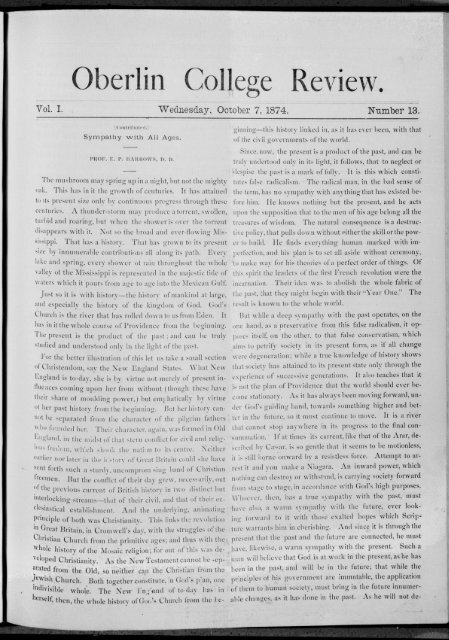
![if 7 O W n College Library] - Oberlin College](https://img.yumpu.com/20199972/1/153x260/if-7-o-w-n-college-library-oberlin-college.jpg?quality=85)
